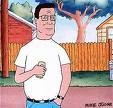I'm working on a pseudo-Tolkien
trifecta right now, a work several months in progress. I finished reading
The Hobbit to Sweetness (yes, she followed most of it, which I can scarcely fathom at age 3), watched the
The Lord of The Rings movie trilogy with
Wifey, and I have now been provoked to re-read
The Silmarillion. Of all this, one thing came to mind: In the movie trilogy (and books, for the typographically inclined), why are the only truly interesting characters
Faramir and, especially,
Boromir?
The writing of Tolkien is engrossing, it really defines the term "epic" for other fiction writers to follow. And so many other writers, particularly fantasy and sci-
fi, have attempted to do just that. One thing that
Tolkien's writings do not have in abundance, though, is characters cast in gray scale. Absolute, selfless, divine good clashes with almost comically wicked evil. Iron-clad courage pursues yellow-bellied cowardice. Self-sacrifice envelopes self-serving avarice. But characters with true weakness to offset some decent qualities are rare. Some of the prequel writings for the
Lord of The Ring trilogy do include great heroes overcome by greed or corrupted by power or blinded by rage. But these are stories told at a great distance of mighty figures and great kingdoms in Paradise Lost (see previous blog), not characters that you get to know intimately or see develop much over time. Very much of the Greek Tragedy vein.
But with
Faramir and
Boromir, you see the struggle between honor and arrogance, obedience and greed, and those conflicts more than any of the (admittedly awesome) special effects are what make repeated viewings or readings of the trilogy worthwhile. While
Faramir struggles with Doing The Right Thing at a key juncture of the story, it never seems likely that he will falter. Once he Sets Things Straight, he gets injured and fades out of relevance.
Boromir, though, is portrayed as mighty and valiant, a born leader. He only sets out on the great journey of the story at the behest of his father, who is already corroded away to
rottenness. He has endured the suffering of his people for his lifetime while striving endlessly for their protection and freedom. In the ring he sees a resolution to every problem he has ever faced, that his whole land has ever faced. And he finally folds. Neither bravery, nor experience, nor strength can prevent him from cracking and committing foul acts. But even through that, he is able to recover, and repenting from his evil ways he commits a last courageous act of sacrifice, selling his life dearly for his comrades. In the movie (I cannot recall if this is true in the book) he even plays a role with his dying words in developing the main character,
Aragorn, whose victory is never really in doubt but at least matures in character during the story.
Who can't get behind characters like that?
